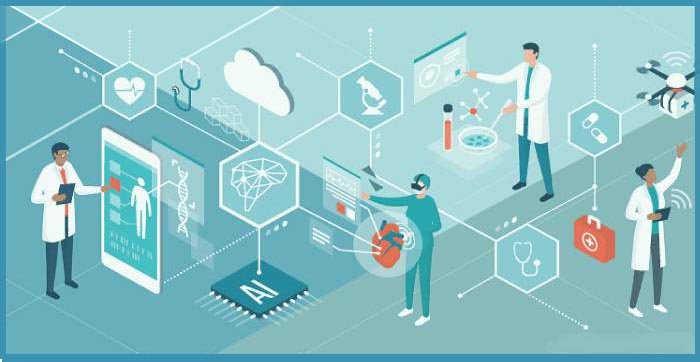By: medekomadmin
Role of AI in the Diagnostic and Medical Field
March 28, 2023

Healthcare is only one of several areas in that artificial intelligence (AI)
has transformed. AI has evolved into a vital tool for medical diagnosis
and treatment due to its ability to quickly examine massive amounts of
data and effectively. Even the most skilled medical professionals may
overlook trends and abnormalities that AI-powered devices and
algorithms may spot, resulting in more rapid and precise diagnoses,
individualized treatment regimens, and better patient outcomes.
We will discuss some of the most recent developments in this fascinating
and quickly developing topic as we look more deeply into the role of AI in
the diagnostic and medical fields. So buckle up and let's explore the
intriguing realm of AI in medicine, in this article.
The capacity of AI to increase diagnosis accuracy is among the most
important advantages it has for the medical industry. Medical imaging
data from X-rays and MRIs may be analyzed by AI algorithms to find
patterns and abnormalities that the human eye would miss. With the use
of this technology, doctors can diagnose patients more precisely and
give them individualized treatment recommendations.
For example, AI-driven software may identify early-stage lung cancer in
CT images, lowering the possibility of a false-positive result and
enhancing patient outcomes. Moreover, AI may review electronic
medical records (EHRs) to find individuals who are at a high risk of
contracting specific disorders, enabling doctors to take early action and
stop the course of the disease.
Improving patient outcomes with AI technology
There are several ways that AI technology might enhance patient outcomes. In order to reduce the need for in-person visits and increase patient involvement, AI-powered chatbots can, for example, give patients access to healthcare information and assistance around the clock. Besides that, AI has been really helpful in reducing errors in medical diagnosis. A medical mistake, such as a wrong diagnosis or incorrect medication, is one of the leading causes of death. By giving doctors real-time decision assistance and notifications, AI technology can help decrease these errors by assuring that doctors have the most current and correct patient information. AI can also decrease pharmaceutical mistakes by reviewing patient data and spotting possible drug interactions or negative side effects.
X-rays, CT scans, and MRI pictures might be examined by AI systems to look for trends and abnormalities that the human eye would miss. As an illustration, AI-driven software may identify early-stage breast cancer in
mammograms, lowering the possibility of a false-positive result and enhancing patient outcomes. Using AI in medical imaging comes with challenges. The above-noted lack of uniformity in imaging methods is among the major issues. The annotated medical photos that are required for training AI systems are also in short supply. Also, there is a chance that AI algorithms might be biased, especially for medical imaging where the incidence of specific illnesses may differ amongst populations. However, with more research and the advancement of technology, these hurdles are expected to resolve.
Notwithstanding the potential advantages of AI in healthcare, a number
of problems and difficulties still need to be resolved. The lack of
consistency in healthcare data is one of the greatest problems. In the
healthcare sector, there is a lack of qualified AI researchers and data
scientists. The use of AI in healthcare also raises ethical questions,
notably in relation to data protection and informed permission.
The price of integrating AI technology in healthcare is another difficulty.
Healthcare professionals and patients may be reluctant to accept new
technologies since they can be expensive to create and maintain.
Also, there is a chance that AI algorithms will be biased, particularly in
terms of racial, ethnic, and gender differences. More cooperation
between healthcare providers, researchers, and technology businesses
is required to solve these issues, as well as more funding for AI research
and development.
The use of AI in healthcare raises a number of ethical issues. Informed
consent and data privacy are two of the main issues. There is a danger
of data leaks and misuse since healthcare data is very sensitive and
private. Patients could also be concerned about prejudice and
discrimination in AI algorithms and may not completely appreciate the
ramifications of utilizing AI in their medical treatment.
The effect of AI on the medical workforce is another ethical issue. There
may be worries about layoffs and the loss of personal touch in
healthcare as a result of the potential for AI technology to automate
numerous jobs now carried out by healthcare workers.
More openness and responsibility in AI algorithms are required, as well
as increased patient and healthcare professional education on the
ethical implications of employing AI in medical treatment, in order to
address these ethical concerns.
Key players in the AI healthcare market
Several businesses and organizations are creating AI-powered solutions
for the diagnostic and medical areas, which is causing the AI healthcare
market to expand quickly. In the AI healthcare industry, some of the
major companies include IBM Watson Health, Google Health, Amazon
Web Services, NVIDIA, and Microsoft. These businesses are creating AI
robots and algorithms for clinical decision assistance, drug research,
medical imaging, and patient interaction. Innovative AI-powered
healthcare tools, including chatbots and virtual assistants, are also being
developed by startups and smaller businesses.
Conclusion
Finally, through enhancing patient outcomes, lowering expenses, and
advancing medical research, AI has the potential to revolutionize the
diagnostic and medical fields. To make sure that AI is utilized responsibly
and openly, it is crucial to thoroughly analyze the ethical and legal
ramifications of its usage in the healthcare industry
- AI's impact on diagnostic accuracy
- Issues and challenges with AI
-
Future of AI in the diagnostic and medical field
- ....By Medekom Marketing team.